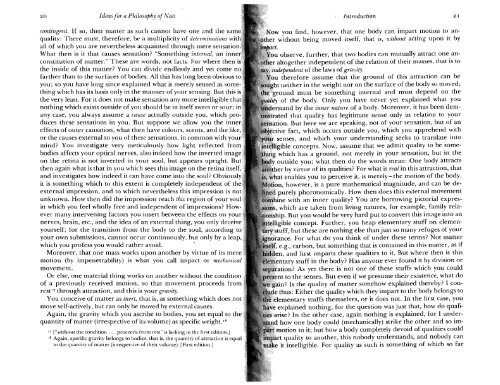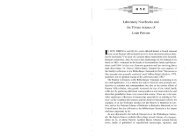Ideas for a Philosophy of Nature
Ideas for a Philosophy of Nature
Ideas for a Philosophy of Nature
You also want an ePaper? Increase the reach of your titles
YUMPU automatically turns print PDFs into web optimized ePapers that Google loves.
20 <strong>Ideas</strong> Fir a <strong>Philosophy</strong> <strong>of</strong>HallIntroduction2 Icontingent. If so, then matter as such cannot have one and the samequality: There must, there<strong>for</strong>e, be a multiplicity <strong>of</strong> determinations witlall <strong>of</strong> which you are nevertheless acquainted through mere sensationWhat then is it that causes sensation? "Something internal, an inneconstitution <strong>of</strong> matter." These are words, not facts. For where then ithe inside <strong>of</strong> this matter? You can divide endlessly and yet come n<strong>of</strong>arther than to the surfaces <strong>of</strong> bodies. All this has long been obvious toyou; so you have long since explained what is merely sensed as somethingwhich has its basis only in the manner <strong>of</strong> your sensing. But this isthe very least. For it does not make sensation any more intelligible thanothing which exists outside <strong>of</strong> you should be in itself sweet or sour; inany case, you always assume a cause actually outside you, which producesthese sensations in you. But suppose we allow you the innereffects <strong>of</strong> outer causation, what then have colours, scents, and the like,or the causes external to you <strong>of</strong> these sensations, in common with yourmind? You investigate very meticulously how light reflected frombodies affects your optical nerves, also indeed how the inverted imagon the retina is not inverted in your soul, but appears upright. Butthen again what is that in you which sees this image on the retina itself,and investigates how indeed it can have come into the soul? Obviouslit is something which to this extent is completely independent <strong>of</strong> theexternal impression, and to which nevertheless this impression is notunknown. How then did the impression reach this region <strong>of</strong> your soulin which you feel wholly free and independent <strong>of</strong> impressions? Howevermany intervening factors you insert between the effects on yournerves, brain, etc., and the idea <strong>of</strong> an external thing, you only deceiveyourself; <strong>for</strong> the transition from the body to the soul, according toyour own submissions, cannot occur continuously, but only by a leap,which you pr<strong>of</strong>ess you would rather avoid. .Moreover, that one mass works upon another by virtue <strong>of</strong> its meremotion (by impenetrability) is what you call impact or mechanicalmovement.Or else, one material thing works on another without the condition<strong>of</strong> a previously received motion, so that movement proceeds fromrest'? through attraction, and this is your gravity.You conceive <strong>of</strong> matter as inert, that is, as something which does notmove self-actively, but can only be moved by external causes.Again, the gravity which you ascribe to bodies, you set equal to thequantity <strong>of</strong> matter (irrespective <strong>of</strong> its volume) as specific weight.:"'7 ["without the condition ... proceeds from rest" is lacking in the first edition.],8 Again, specific gravity belongs to bodies, that is, the quantity <strong>of</strong> attraction is equalto the quantity <strong>of</strong> matter (irrespective <strong>of</strong> their volume). [First edition.]"ow you find, however, that one body can impart motion to anwithoutbeing moved itself, that is, without acting upon it byrt.u observe, further, that two bodies can mutually attract one analtogetherindependent <strong>of</strong> the relation <strong>of</strong> their masses, that is to'pendent <strong>of</strong> the laws <strong>of</strong>gravity.there<strong>for</strong>e assume that the ground <strong>of</strong> this attraction can bet neither in the weight nor on the surface <strong>of</strong> the body so moved;round must be something internal and must depend on the:y <strong>of</strong> the body. Only you have never yet explained what yourstand by the inner nature <strong>of</strong> a body. Moreover, it has been dernatedthat quality has legitimate sense only in relation to yourtion. But here we are speaking, not <strong>of</strong> your sensation, but <strong>of</strong> antive fact, which occurs outside you, which you apprehend withsenses, and which your understanding seeks to translate intoigible concepts. Now, assume that we admit quality to be somewhichhas a ground, not merely in your sensation, but in theoutside you; what then do the words mean: One body attracts.er by virtue <strong>of</strong> its qualities? For what is real in this attraction, thatat enables you to perceive it, is merely-the motion <strong>of</strong> the body.n, however, is a pure mathematical magnitude, and can be depurelyphoronomically. How then does this external movementine with an inner quality? You are borrowing pictorial expreswhichare taken from living natures, <strong>for</strong> example, family relaip,But you would be very hard put to convert this image into anigible concept. Further, you heap elementary stuff on elementuff,but these are nothing else thanjust so many refuges <strong>of</strong> yournee. For what do you think <strong>of</strong> under these terms? Not matter, e.g., carbon, but something that is contained in this matter, as ifn, and first imparts these qualities to it. But where then is thistary stuff in the body? Has anyone ever found it by division ortion? As yet there is not one <strong>of</strong> these stuffs which you couldnt to the senses. But even if we presume their existence, what doin? Is the quality <strong>of</strong> matter somehow explained thereby? I conthus:Either the quality which they impart to the body belongs tolementary stuffs themselves, or it does not. In the first case, youexplained nothing, <strong>for</strong> the question was just that, how do qualirise?In the other case, again nothing is explained, <strong>for</strong> I underhowone body could (mechanically) strike the other and so irnotionto it; but how a body completely devoid <strong>of</strong> qualities couldt quality to another, this nobody understands, and nobody canit intelligible. For quality as such is something <strong>of</strong> which so far



